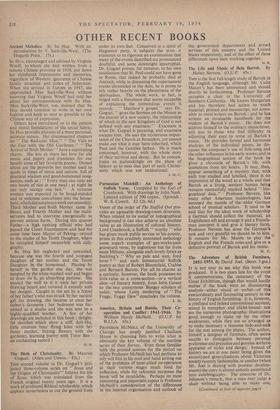The Birth of Christianity. By Maurice Goguel. (Allen and Unwin.
42s.) under its own feet. Conceived in a spirit of Huguenot piety, it subjects the texts it examines to so rigorous an examination that many of the events described are pronounced doubtful, and some downright apocryphal. Dr. Goguel proves, for instance, to his own satisfaction that St. Paul could not have gone to Rome, that indeed he probably died at Antioch, while in discussing the supernatural events chronicled in the Acts, he is prone to rely rather heavily on the phenomena of the spiritualists. The whole work, in fact, is tinged with a literalness that seems incapable of explaining the tremendous events it records. Matthew's .gospel," says Dr. Goguel, " gives the Sermon on the Mount as the charter of a new society, the relationship of which to the new Kingdom of God is not defined with any exactness." Exactness is what Dr. Goguel is pursuing, and exactness escapes him. He sees the mysterious impor- tance of the Church at Jerusalem, yet cannot make out what it may have inherited, which Paul and the Gentiles lacked. He is much concerned,, however, with the whole story of their survival and decay. But he concen- trates so painstakingly on the plane of history as to miss that part of early Christi- anity which was not institutional.
' J. M. C.


































 Previous page
Previous page